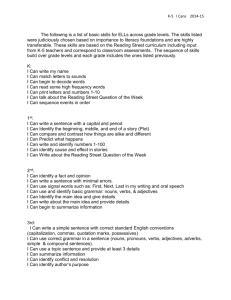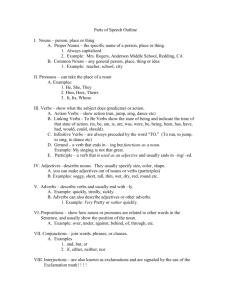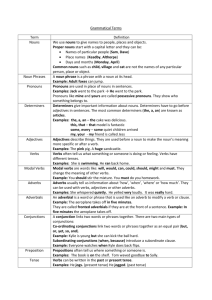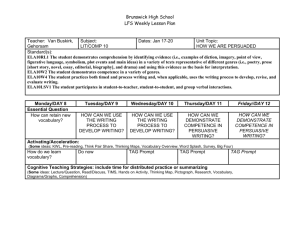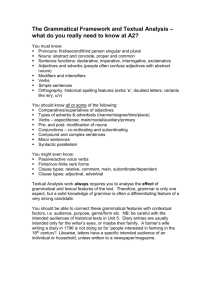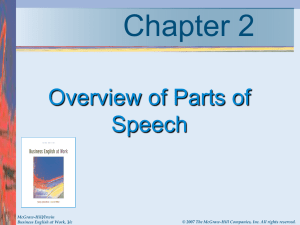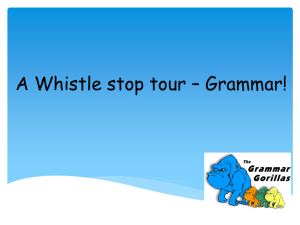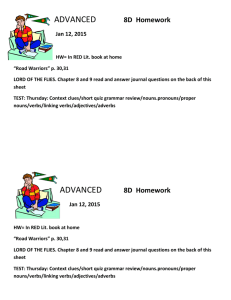Grammar for Grade 9 I Parts of Speech
advertisement
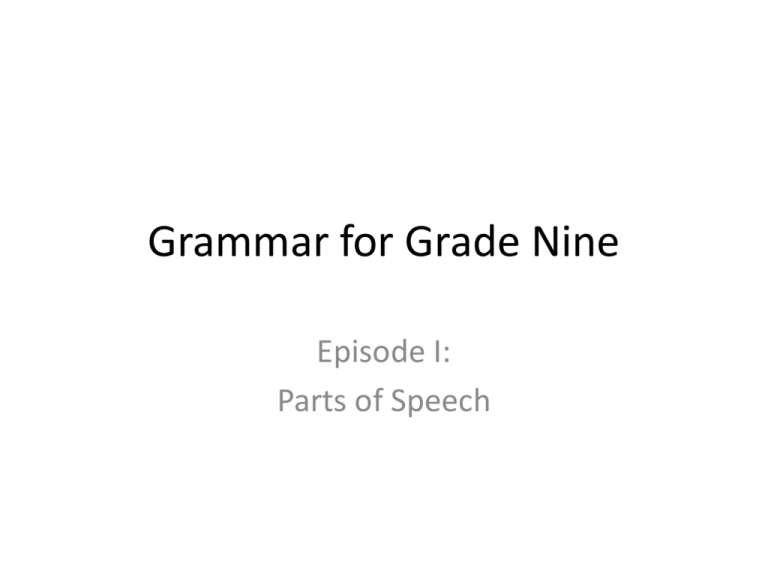
Grammar for Grade Nine Episode I: Parts of Speech Nouns: definition • Nouns name people, places, things, or ideas. – grandfather – kitchen – peacock – vegetarianism – downtown – happiness Noun Types: Concrete • Concrete nouns identify objects that are tangible or can be identified through the senses (things we can see, hear, touch, taste, smell). – hoof – fog – yawn – melodies Noun Types: Abstract • Abstract nouns name ideas, qualities, or characteristics which cannot be touched, seen, heard, tasted or smelled. – fear – spirit – love – kindness – dreams Noun Types: Proper • Proper nouns name particular people, places, things or ideas. Proper nouns always are capitalized. – Elizabeth Cousar – Canada – Islam – Taj Mahal – Fraser River Noun Types: Collective • Collective nouns name groups. The singular form is sometimes considered singular, and sometimes considered plural. – committee – choir – (a) pride (of lions) – (my English) class Pronouns • Pronouns are words that take the place of nouns, groups of words that can act as nouns, or other pronouns. • Consider this sentence: When Mrs. Cousar gets up, Mrs. Cousar makes coffee and takes the coffee into Mrs. Cousar’s shower. • This sounds better: When Mrs. Cousar gets up, she makes coffee and takes it into her shower. Pronoun Types: Interrogative • Interrogative pronouns are use to form questions: – who – what – whatever – whom …and so on. Pronoun Types: Relative • Relative Pronouns introduce subordinate clauses. ex: Rene, who is from Paris, drives a Porsche. ex: The house that we spoke about has been sold. ex: The trait of writing with which students struggle most is definitely voice. Note: who = people, that = people or things, which = things. Pronouns: Cases I • Subject pronouns are the ones which can be used as the subject of a sentence. They are sometimes called “subjective case” pronouns. – I, you, he, she, it, we, they, who • Object pronouns are the ones which serve as the object (direct or indirect) of a sentence, or as the object of a preposition – me, you, him, her, it, us, them, whom Pronouns: Cases II • Possessive pronouns show that the pronoun (or its antecedent) owns something. – my/mine, your/yours, his, her/hers, its, our/ours, their/theirs ex: This is my textbook, not yours. ex. Our mother has talked to their teacher. Verbs: Action Verbs • Verbs are words which indicate an action or a state of being. • Action verbs describe physical or mental action: – jog --smile --think • Action verbs can be transitive (they require a direct object) or intransitive (they don’t); sometimes an action verb can be transitive in some circumstances and intransitive in others. Verbs: Linking Verbs • Linking verbs connect the subject of a sentence with words or groups of words that identify or describe it. • All forms of the verb to be can function as linking verbs: – Tomorrow will be bright and sunny. – Oro is the Spanish word for gold. • Other common linking verbs include seem, remain, appear, smell, feel, look, become, taste, and sound. There are others. Adjectives • Adjectives modify (describe) nouns and pronouns. They answer the questions which one(s)? or what kind? – eerie room --some people --latest fad • Many adjectives have comparative and superlative forms: Hot Hotter Hottest Sharp Sharper Sharpest Psychic More psychic Most psychic • The adjectives a, an and the are called articles. Adjectives: Proper Adjectives • Proper adjectives are formed from proper nouns. They are always capitalized. – Italian opera – French cheeses – Buddhist thought – Sikh culture Adverbs • Adverbs modify verbs, adjectives and other adverbs. – run quickly --deeply embarrassed – quite nicely • Adverbs answer the questions when? where? how? and to what degree? – when? soon, yesterday, earlier… – where? there, here… – how? carefully, eagerly, rapidly… – to what degree? very, quite, completely… Adverbs: Placement • Adverbs always precede (go before) the adjectives and other adverbs they modify: – rather handsome – just barely • Their position in relation to verbs can vary. – I disagree with you completely. – I completely disagree with you. – I disagree completely with you. Prepositions • Prepositions show relationships of nouns and pronouns to other words in the sentence. These relationships often involve space or time. – in the closet – during the dance – since yesterday --after lunch --outside the perimeter --from the government Prepositions II • Compound prepositions consist of more than one word: – according to the law – out of the question --on top of Old Smokey • Prepositions begin phrases that conclude with a noun or pronoun. This noun or pronoun is called the object of the preposition. – A wounded deer stood in front of the car. • prepositional phrase: in front of the car • object of the preposition: car Conjunctions • Conjunctions are words which join together two words, sentences, phrases, or clauses. • Coordinating conjunctions give equal emphasis to two main clauses. There are only seven of them. Think FANBOYS. – for, and, nor, but, or, yet, so • I hate to exercise, and I love to eat, so I am fat. • When a coordinating conjunction is used to connect two main clauses, a comma is required before the coordinating conjunction. Subordinating Conjunctions • Subordinating conjunctions join two clauses to that one clause depends grammatically on the other. • The clause introduced by the coordinating conjunction is called a dependent clause. It cannot stand alone as a sentence. – ex: When he hit me, I gasped in shock. • “When” is the subordinating conjunction. • “When he hit me” is a dependent clause. • There are many subordinating conjunctions in English, including before, unless, until, while, as soon as, in order that, since, while, although, as far as, and after. There are others.
